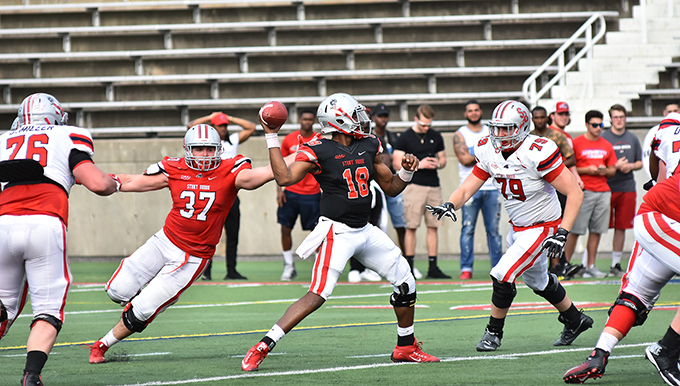 For many years there has been a common notion, that states “Athletes are receiving a free degree and education. If anything happens, they’ll always have a backup plan.” Frankly, I believe this idea has proven false in many cases. Overall, there are slightly higher graduation rates, but more than ever, we have athletes suffering from mental issues, transition problems and difficulty managing their lives after sports.
For many years there has been a common notion, that states “Athletes are receiving a free degree and education. If anything happens, they’ll always have a backup plan.” Frankly, I believe this idea has proven false in many cases. Overall, there are slightly higher graduation rates, but more than ever, we have athletes suffering from mental issues, transition problems and difficulty managing their lives after sports.
Education and success after college by any means isn’t a sure thing. Athletes are merely being offered the opportunity to be educated without substantial access or time to gain any necessary resources, experience or skills, which are what actually lead to success in the real world. They are being pushed through a system which feeds into the perception that NCAA board members are providing these student athletes with a “better life than they would have without sports.”
In actuality, they don’t get a real education. If they do happen to graduate and don’t go on to play professionally, all they have is a ticket out the door into the real world, fending for themselves by using only what they learned through sports for 4 years. It’s a recipe for failure, not success. The NCAA seems to pretend like they deeply care about the well-being of these athletes, but many people seem to feel otherwise. While there isn’t much hard data to prove many of these claims, the NCAA does receive millions in profit withholding athletes from their cut; furthermore, not allowing them to pursue any means of entrepreneurial or self branding endeavors. Besides a few general studies courses and a pat on the back, often times athletes aren’t getting much of anything once they step out of school.
Many of these athletes come from lower class backgrounds and do not have the connections or opportunities that many of their classmates do. They also cannot take internships because of scheduling conflicts and other sport related obligations. Without a class schedule that could help prepare them for a career relative to their major, many athletes find themselves out of luck finding a job once their eligibility expires. And that’s even if they are remotely interested in whatever their major is.
With the lack of a meaningful degree, it is difficult for many athletes to get a entry-level job once they graduate. Schools, as well as the NCAA, continue to push the idea that getting degrees, which are simply pieces of paper granted for staying academically eligible, is all that matters. Most athletes have no clue what they really want to do and no one is helping them figure it out. A lot of athletes are clustering and getting the same degrees as one another, not only because everyone around them is doing it, but because they are advised to by people who surround the athletic program. These are young kids with no real guidance about life after sports. This failure to address this disadvantage honestly might be the biggest issues in the college athletics parody.
Former Florida State football player and Rhodes Scholar Myron Rolle quotes,
“A lot of (players) would go through this academic machinery in their colleges and be spit out at the end of that machinery, left torn, worn and asking questions, with really no guidance on where they should go,” Rolle said. “No purpose, no idea of their trajectory, and sometimes left with a degree in hand that didn’t behoove any of their future interests.”
The Solution
If these schools aren’t providing the necessary requirements for athletes to move toward a better future, then there needs to be external resources brought in to help lead these athletes in the right direction or these athletes have to do it on their own.
The job market is more competitive than ever and in 2017, a degree is not going to help with the basic skills needed to transition and succeed in the corporate world. As an athlete, you have to take your future into your own hands, and develop the necessary competencies outside of sports while you are still playing.
Whether it is learning to draft a resume and cover letter, building interviewing skills, learning corporate etiquette or even developing your professional social media profiles. The sad truth is that more initiative has to be taken by the athletes if they want to have success after sports.
Author Bio: Malcolm Lemmons is an athlete turned entrepreneur, author and speaker. He now uses his experiences to help athletes transition through different phases of their careers and prepare for life after sports.
